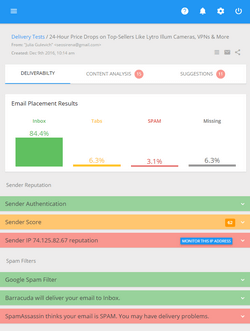How to Send More Targeted Email Campaigns to Your Subscribers

On my opinion teaching marketers how to create email campaigns in the right way – with a double opt-in subscription method, optimized email newsletter, proper sender authentication records, bounce email management system and reliable unsubscribe procedure – is more important than telling the marketers what not to do. When you clearly understand what and how to do, you can set your goals, define the stages of your marketing campaign and put it into practice. But of course, being aware of common email marketing mistakes is also a must.
In the circumstances when budgets are more carefully estimated, planned and retrenched, email marketers will need to revise their marketing programs and find alternative email marketing approaches.
On my honest opinion, the “send more emails to make more money” approach will not work anymore. Why am I thinking so? Because prospects are becoming thriftier and are planning purchases as wisely as never before. They want to spend their money for the things they really need in their life. Despite the fact that email is the cheapest promotional means, you’ll be out of pocket if no one buys from you. So, rather than increasing the volume of emails you send, you’ll want to stick to a different concept – achieving a greater relevance. You’ll want to make your messages more valuable and meaningful to your subscribers. I put several meanings into the word “relevance”: value of the email content, content match with the subscriber’s interests, optimal email frequency, and maintenance of the list activity.
If you are not sure what to start from, look at email marketing programs below for some ideas how you can make your email campaigns more relevant to your subscribers:
Email Campaign Segmentation
This makes sense if you have more information about your subscribers than the standard “Email”, “First Name” and “Last Name”. You can divide your list into smaller groups and create different copies of the email for each segment. Or, you can email the same copy of the message to all your audience but with a slightly different content that will vary depending on the user data, for example, purchase or subscription date, purchased product or service, chosen preferences or whatever.
Segmenting the audience and designing different email copies for each group takes a bit more work and maybe that’s why it’s often overlooked. However, this is a great opportunity to increase your email campaign relevance, generate a higher response rate and drive more sales.
Email Broadcast
If you run a blog, this is a good way to keep your subscribers informed about what is happening on the site. An email broadcast is the simplest of campaigns because it’s done automatically without your participation. One of the plugins that sends an email broadcast is a free Double Opt-In plugin for WordPress blogs. You need to setup it only once and the email broadcast will be sent to your subscribers at regular time intervals based on the quantity of new posts you add to the blog.
Bad news is that it sometimes gets overused. As the email broadcast doesn’t require as much time and effort investment as regular email campaigns, marketers tend to send it too frequently. Increased frequency can lead to increased rate of unsubscribes and spam complaints. When you setup your email broadcast program, you’ll want to make sure it matches your promise about the email frequency during the signup process. If you say you’ll be emailing them twice a month, they’ll expect two letters from you per month. What a bad surprise for them if you start filling in their Inbox every other day. So, don’t email more without any reason for it.
Product Lifecycle Emails
Like broadcast emails these messages are also sent automatically after a customer or a subscriber takes or does not take a specific action over a product lifecycle. Lifecycle emails can include a welcome message after the fact of purchase, technical support query, customer survey for future product versions, pre-sale emails based on the customer’s purchase, account re-activation emails, etc.
Such emails tend to be highly relevant because they result from the action the customer takes. Developing a lifecycle email program takes some programming knowledge but when it’s setup, it will launch with minimal effort from your side.
List Activity
To my thinking, a bigger challenge for email marketers is not how to obtain new subscribers to the list but how to keep existing readers active. Getting new members is easier because people are attracted by something new and want to know more about it. But if your newsletters are not valuable to them, sooner or later they will lose interest in your mailings.
In addition to an easy and clear “Update Profile” option in case of the email address change, consider the following tips to retain subscribers on your list:
- Tell them why they should subscribe during the signup process and remind them about the benefits of being on your list in your regular newsletters.
- Provide them with other ways to follow you besides email. If you have social network accounts on Twitter, Facebook, etc. include a “Follow me on Twitter” link into your newsletter.
- Identify inactive subscribers who did not act upon your emails during a period of time and try to re-engage them.
- If they don’t respond to your “re-engage” emails, send them a final survey message asking if they would like to continue receiving emails from you, or prefer to be removed from your list.
But don’t forget about the most proven way to keep the subscribers – in fact, that is what this article is about – regular mailings with valuable and meaningful content.
To sum up, when you think about making your email marketing channel more effective, don’t simply increase the email frequency. Instead, think about expanding your email program with new approaches that will help you make your emails more relevant and meaningful to your customers or subscribers.
